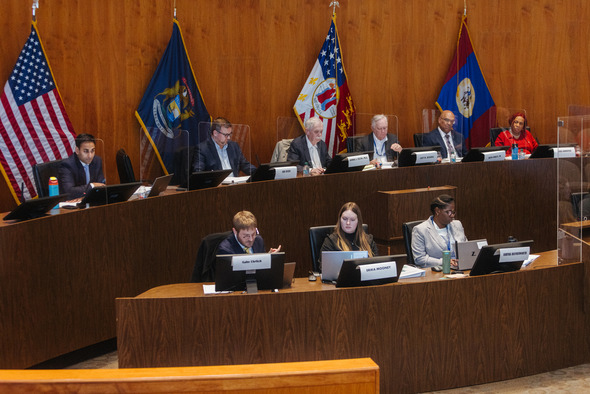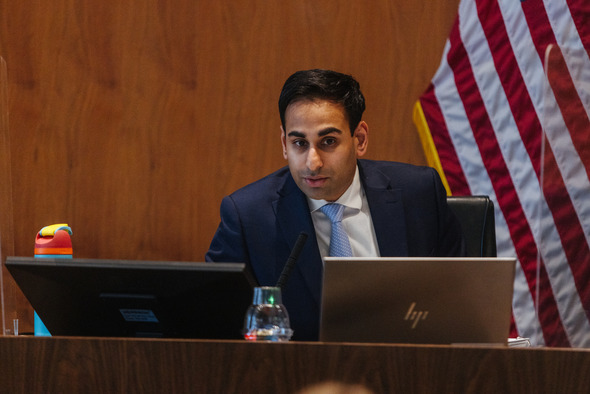City of Detroit Reports Revised Revenue Estimates for Fiscal Years 2025-2029
- Detroit’s economy projected to grow over the next five years, despite cooled labor market
- Larger paychecks predicted for Detroiters and workers in the City
- Growth in revenues led by income tax, and wagering tax revenues
On February 10, the City of Detroit held its regular biannual Revenue Estimating Conference to receive an update on the Detroit economic outlook and approve new economic and revenue forecasts for the remainder of fiscal year 2025 and for fiscal years 2026 through 2029. State law requires the City to hold independent revenue conferences in September and February each fiscal year to set the total amount available for its annual budget and four-year financial plan.
Detroit’s revenues are projected to grow over the next five years, without consideration to uncertainty surrounding national economic policy. The projection is in alignment with the Detroit Economic Forecast for 2024-2029 released by the University of Michigan earlier this month.
The economic outlook report says, “Detroit's economy will return to growth this year as monetary policy eases and interest rates moderate. By the end of 2025, we forecast resident employment to be 1.0 percent higher than at the end of 2024, although still below its peak in 2023. We forecast payroll employment to grow slightly faster at 1.1 percent.”
The forecast also predicts larger paychecks for Detroiters and those who work in the City. Wages for City residents are expected to grow by 3.8% per year through 2029, climbing from around $45,000 in 2025 to nearly $55,000 in 2029, outpacing both the 3.4% growth for jobs located in the city and the 3.0 % growth statewide. While disparity in wage levels remains between Detroit residents and jobs in the city, the gap is reduced over the forecast period.
Revenue Outlook improves, remains stable
The City’s revenue outlook continues to improve, with steady growth in income taxes, which follow our continuing efforts to drive economic opportunity and growth. The Revenue Conference has revised revenue estimates slightly upward for the current fiscal year, showing the economy’s resilience in the face of what the economic forecast described as a “cool down in the local labor market.”
The City’s revenue estimates stem from the latest economic projections and forecast models. As with any forecast, there are potential risks to the estimates approved today, including federal economic policies. However, the City’s efforts to continue attracting economic development projects and higher-wage jobs for Detroiters can help mitigate such risks and provide an unforecasted upside.
“The City’s economy is showing some resilience, as we see revenue growth in the face of challenges in the labor market. The growth we’re seeing, for example, in our income tax revenue stems from higher paying jobs for residents and workers in the City. The administration’s efforts to spur economic activity creating higher paying jobs ultimately help in maintaining fiscal stability allowing Detroit the ability to fund its obligations while also improving the quality of life for Detroiters,” said Jay Rising, Chief Financial Officer, City of Detroit.
Revenue Estimating Conference Results
The Revenue Conference reported FY2025 General Fund recurring revenues projected at $1.402 billion for the fiscal year ending June 30, 2025, up $20.3 million (1.4%). The increase is primarily due to higher income tax collections.
General Fund recurring revenues for FY2026, which begins July 1, 2025, are now forecasted at $1.434 billion, an increase of $32.0 million (2.3%) year-over-year compared to the revised FY2025 estimates. This is a $104.7 million (7.9%) increase from the FY 2025 adopted recurring revenues. The projected increase is led by growth in income tax collections and wagering taxes as Detroit casinos continue to see higher adjusted gross receipts for retail & internet gaming. The out-year forecasts for FY2027 through FY2029 show continued overall recurring revenue growth of about 2.6% per year.
Recurring General Fund Revenue Estimates
FY 2025 | FY 2026 | FY 2027 | FY 2028 | FY 2029 |
$1,401.9 million | $1,433.9 million | $1,469.3 million | $1,505.5 million | $1,547.2 million |
Annual Growth | $32.0 million (2.3%) | $35.3 million (2.5%) | $36.2 million (2.5%) | $41.7 million (2.8%) |
Fiscal Year | Sept 2024 Conference | Feb 2025 Conference | Change from Sept 2024 Conference |
FY 2025 | $1,381.6 million | $1,401.9 million | $20.3 million |
FY 2026 | $1,412.6 million | $1,433.9 million | $21.4 million |
FY 2027 | $1,442.7 million | $1,469.3 million | $26.6 million |
FY 2028 | $1,477.1 million | $1,505.5 million | $28.4 million |
FY 2029 | $1,508.0 million | $1,547.2 million | $39.2 million |
The City will use the estimates approved today for the City’s FY2026 Budget and FY2026 through FY2029 Four-Year Financial Plan. The voting conference principals are Jay B. Rising, the City’s Chief Financial Officer; Eric Bussis, Chief Economist, Director, Office of Revenue and Tax Analysis, Michigan Department of Treasury; and George A. Fulton, PhD, Director Emeritus, Research Professor Emeritus, Research Seminar in Quantitative Economics (RSQE), Department of Economics, University of Michigan.
Find more information on the Revenue Estimating Conference at www.detroitmi.gov/budget.
Detroit Economic Outlook Report for 2024-2029
Revenue Estimating Conference February 2025 - VIDEO



